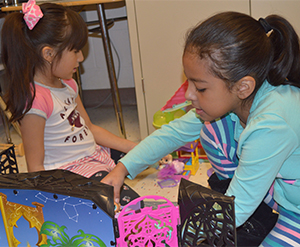There was a shark in the container with the fish. What could go wrong?
“They are all in a fight! They are all in a fight!” shouted a kindergartner.
Three other students joined the action, playing with plastic creatures in the container filled with water. “Crab, pinch, pinch, pinch!” one shouted.
Moments later they tested each animal one-by-one to see which floated and which sank. Things had gone from a fish fight to a lesson in buoyancy in a matter of minutes, and no adult was telling them what to do.

It was Day of Play at Godfrey-Lee Early Childhood Center, during which kindergarten through second-grade students spent the entire school day having unstructured, screen-free fun. Students roamed unfettered from room to room choosing activities and deciding for themselves how to direct them. Outside, they torpedoed downhill on sleds and tumbled in the snow.
The Godfrey-Lee Public Schools event was part of Global School Play Day, which raises awareness of the necessity of unstructured play. According to the the website, 175,000 students participated worldwide.
“We get to play games, just hang out with your friends,” said student Deztiny Castillo. “I played with my friend, and with shaving cream, and I got to go outside, and I got to paint.”
In today’s academic world of grade-level expectations, when standardized tests begin in kindergarten, Day of Play lets students get back to the basics, teachers say. Students brought in battery-free toys and dress-up clothes, and classroom floors and tables were covered with LEGO, building blocks, Polly Pockets and play sand.
But it wasn’t about giving students a break or a reward. Research shows there’s a lot going on when children play and adults back off, said Superintendent David Britten.
“Play is a more enjoyable learning setting because the focus is always on the means, rather than the end,” Britten said. “Adults tend to push toward being successful, achieving a high level or winning. Kids, however, play for the sake of enjoying the game or activity, not necessarily what results from it.”
Important social skills develop as well, Britten said. When children play on their own they learn to solve problems through logical sequence as well as trial and error. They also learn consequences of their actions.
“Because kids who play are sort of like ‘free agents’ in a game or activity, they learn the rules of behavior and how to treat others in the game,” he added. “The consequence is they may not be allowed to continue playing, or they may not be asked next time to join in the fun. Thus, self-control is gained far better than being forced on them by an adult in a setting in which the child doesn’t want to be there anyway.”

What Happened to Play?
But play has been disappearing from classrooms. Five-year-olds today face full days of rigor formerly reserved for first-graders, one teacher says. In the past, kindergarten included ample time for play, exploration, art and music.
“Kindergarten used to be a time for social development and coming in and acclimating themselves to a school environment and separating home and school,” said Godfrey-Lee ECC kindergarten teacher Char Walsh. “Now it’s curricular. They are just continually adding more curriculum.”
According to the 2009 report “Crisis in the Kindergarten: Why Children Need Play in School,” kindergartners now spend far more time being taught and tested on literacy and math skills than they do learning through play and exploration, exercising their bodies and using their imaginations. At a school studied in Los Angeles, kindergartners spent 88.6 minutes on literacy instruction, 46.9 minutes on math instruction, 21 minutes on testing and test prep, and 19.1 minutes on choice time.
But Walsh sees them thrive when they get to choose their own activities.
“Play is the vehicle for all learning for young children,” she said. “The free choice gives them ownership and helps them develop at their level in areas they are strong in. Language and problem-solving are skills that develop naturally through play.”

‘Without Us Hovering Around Them’
During Day of Play, first-grade teacher Deedee Stasiak stood outside her classroom as students walked by holding cardboard boxes and with their hands covered with shaving cream. All her students were off somewhere, playing.
“There are really no rules besides no running (inside), get along with everyone and just have fun. The teachers are really standing back and letting the kids totally do their own thing,” she said.
At first students weren’t sure what to do, she said. They weren’t used to unscheduled play. Then they caught on and off they went.
“I feel like in school there aren’t so many opportunities anymore for kids to just explore and create a game, make up a new game. This just gives them the opportunity to do whatever they want and be creative and be innovative and have fun,” Stasiak said.
Principal Peter Geerling said there’s another message students hear when they are told they can choose what to do.
“It give kids the sense of responsibility and pride that we trust them, saying ‘You can do what you want without us hovering over you,'” Geerling said. “I think kids really thrive from that.”
CONNECT
Back-to-Basics: Play in Early Childhood
Maryland School Shifts Back to Play-Based Kindergarten
Crisis in the Kindergarten: Why Children Need Play in School
Kindergarten in Finland is All About Play










